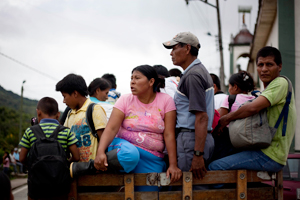
Conflict and human rights abuses have led to 3.4 million people officially registered as internally displaced (IDPs) in Colombia.
Credits: Caritas 2010
The Caritas Working Group for Colombia says the human rights situation in Córdoba continues to be critical.
The group of European Caritas agencies and Secretariado Nacional de Pastoral Social/Caritas Colombia visited the department of Córdoba from 25 to 28 October 2011. Their visit included the municipalities of Montería and Tierralt. During the visit, the group met with civil society organisations and church and community leaders.
Caritas says the situation is as a result of the military confrontations between the army and illegal armed groups, including the FARC guerrillas, the so-called criminal bands and the groups that have emerged from the demobilisation of the paramilitary groups.
The number of mass displacements has increased in the past two years and the confinement of the civilian population continues, especially in the rural areas of Tierralta, Puerto Libertador, Montelíbano and Uré (sub-region of Alto Sinú and Alto San Jorge).
The lack of government presence and social services for the victims of the armed conflict is particularly worrying. Some institutions are only open to the public one day per week, while victims have to endure long waiting times; some people even queue overnight with no guarantee that they will be seen to. The violence in the region has particularly affected vulnerable groups such as the Embera and Zenu indigenous groups, Afro Colombians, campesino leaders, women and displaced people. are
The Caritas Working Group for Colombia are alarmed by the increased risks and threats faced by human rights defenders.
The Caritas group puts forward the following recommendations:
To the Colombian government:
- Maintain the political will to deal with the humanitarian crisis and increase the State’s social presence in the region in order to improve the support and protection provided to victims and community leaders;
- Ensure that the State’s security policy is aimed above all at guaranteeing human rights and International Humanitarian Law;
- Improve the efficiency of the State’s response to early warning systems and risk reports produced in the region.
To the international community:
- Closely monitor the humanitarian crisis and human rights situation in the region through a direct presence in the field, with a specific focus on the needs of affected communities;
- Ensure that foreign investment in the region promotes local development based on the respect for human rights and prior consultation of communities.
Signed by the Caritas Working Group for Colombia
CAFOD, Caritas France, Caritas Germany, Caritas Spain, Caritas Norway, Caritas Switzerland, CORDAID, Secretariado Nacional de Pastoral Social/Caritas Colombia¸ Trócaire
Contact: Laura Chacón González Sección de Formación, Investigación e Incidencia, Secretariado Nacional de Pastoral Social – Cáritas Colombiana www.pastoralsocial.org Conferencia Episcopal de Colombia Tel: (571) 4377150 Ext.: 463. Cel:313 8867778
